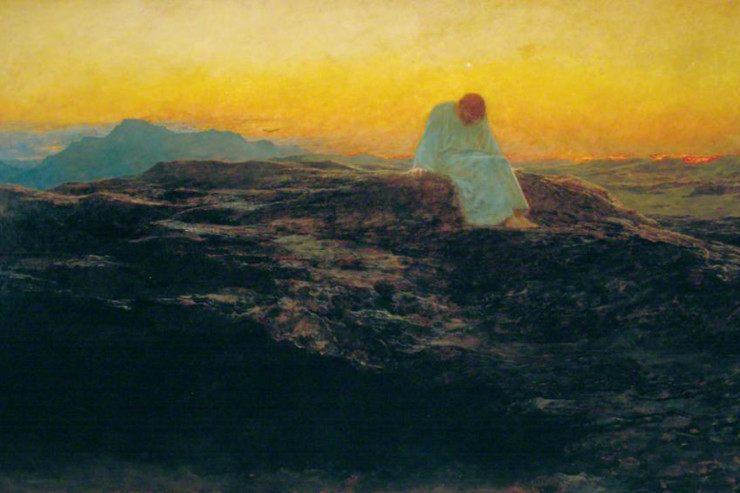“We should be concerned for our children’s faith and morality. It is hard to imagine a time when the moral climate has been more toxic for our youth, and for us, than it is today. It seems there has never been greater peer pressure on our youth to engage in destructive behavior.“
An Invitation to Enter the Desert with Christ
We just observed Ash Wednesday on March 2! It probably seems like Christmas was not that long ago, and now our observance of Lent has begun. It is not too late to think about how we can best spend this Lent.
The Lord invites each of us to enter the desert with Him—to turn away from sin and towards our God.
This is a penitential season during which we are called to face difficult questions. This challenge should be approached with honestly, with humility, and with a firm resolve to prayer and action.
So, my encouragement to you today is to not let this Lent slip by unfulfilled.
So often, we struggle in this life and fail to understand why we are not, at this or any given moment, satisfied. I think this is especially more apparent in these days of continued and persistent societal uncertainty.
Our nations, and maybe our families, continue the downward spiral deeper into debt. Many are finding it more difficult to make ends meet, even while working harder.
And now, after an extremely difficult two years of pandemic, we are faced with the horror of war in Europe and the loss of innocent lives at the hands of evil. I know many are concerned for their children and grandchildren—what they are presently experiencing and for their future. We hope for a future of peace and prosperity.
We should be concerned for our children’s faith and morality. It is hard to imagine a time when the moral climate has been more toxic for our youth, and for us, than it is today. It seems there has never been greater peer pressure on our youth to engage in destructive behavior. We face new challenges as our governments attempt to impose sinful choices upon us.
In years past, we knew right from wrong and too often chose what was wrong. Today, we seem not even to know right from wrong. Therefore, we face a far more dangerous challenge than we have in the past because we have lost our way and we don’t even seem to acknowledge the fact. We are, however, vaguely aware that all is not as it should be.
The Emptiness Deep Within—A Call for Conversion and Surrender
There is an emptiness deep within our very being calling to us to stop and change direction.
- Do we hear it?
- Are we humble enough to listen?
- Are we wise enough to understand?
- Are we courageous enough to act?
- Or does our pride tell us that we know better than that still quiet voice of God.
Here is a simple truth. God made us. He knows best what we were made for. If we conform ourselves to His will for us, we will be on the right path and then, and only then, will we find peace and experience the blessedness spoken of by Jesus in the Beatitudes.
These last two years of pandemic have certainly been a challenging time. And maybe that’s not the only difficulty, or even the most difficult curveball that life has thrown at you.
It seems only natural, what we might call “second-nature”, to look to the world’s answers for solutions to our problems. And that is not all wrong, is it?
When we are unemployed, it is prudent to polish and update our resumes and work our networks to find that new position. When we are physically sick, it is prudent to seek medical care. It is even normal to see ourselves turn to God in prayer and petition Him for help and solutions. But here’s the question…
When turning to prayer, do we dictate to God what His help and those solutions must be?
What we must truly be willing to do is to turn to Him in humility and trust, committed to faithfully surrendering our lives to His will.
That is, we must welcome His answers, His teaching, and His vision (the Divine Plan) for who we are to be, even if this do not conform to our vision for ourselves.
Now you might say, “Deacon Mike that is not practical guidance for our times. You just don’t understand what I face!”
Look, I am not just a deacon. I am a husband, a dad, a grandfather, and a business owner. I have met and cherished my wife, I have loved and buried my mother, dad, sister, and other loved ones. I have worked to support myself and my family for nearly 50 years.
From this school of practical wisdom and the grace of Jesus Christ, I can promise you this… If you don’t get this right, if you don’t grasp and embrace both who you were made to be and your relationship with the God Who made you, you will get nothing right that truly matters.
Earth is not our home; it is simply the place of our journey in faith.
We speak of being on the right or wrong path, but let’s look at what that implies… that each path leads somewhere. The right path leads to our blessedness and our reward in heaven. The wrong path leads to condemnation and eternal hell. It is hell that we should fear most. It is God and our home with Him in heaven that we should desire most.
Speaking of times past, when we knew these truths and simply failed to live them, we had the hope of repentance and God’s grace to right our ship. Today, too many do not know and accept these truths.
So, it seems to me that what we also really need today is a renewed knowledge of God and His Divine Plan for us. Dr.
Peter Kreeft, in a wonderful little book titled Back to Virtue, skillfully reminds us of this. (A prayerful reading of this book would be a good Lenten exercise.)
Living God’s Divine Plan for Our Lives
So, what is God’s vision of who we are to be?
First and foremost, He wants our hearts.
Prophetically, we are taught this by the words given by God to Jeremiah to pass on to us (Jeremiah 17:5-8). … Cursed is the man who places his trust in himself alone, whose heart is not turned towards God. But blessed is he whose trust and hope is in the Lord.
In Luke’s Gospel (Luke 6), Jesus called the Twelve aside and appointed them to be His apostles. Together with Him, they descended the mountain to where the multitude was gathered, and Jesus delivered His Sermon on the Plain. Symbolically, He came down from the heights and met the people where they were, where so many are today… confused and lost; feeling alone and incomplete… and He gave them the only Truth that would satisfy their needs.
To those humbly seeking Him, He spoke the words of Beatitude.
“Blessed are you who are poor, for the kingdom of God is yours. Blessed are you who are now hungry, for you will be satisfied. Blessed are you who are now weeping, for you will laugh. Blessed are you when people hate you, and when they exclude and insult you, and denounce your name as evil on account of the Son of Man. Rejoice and leap for joy on that day! Behold, your reward will be great in heaven” (Luke 6:20-23).
But to those others who were not seeking Him in humility, He spoke the words of condemnation to move them to repentance.
“But woe to you who are rich, for you have received your consolation. Woe to you who are filled now, for you will be hungry. Woe to you who laugh now, for you will grieve and weep. Woe to you when all speak well of you, for their ancestors treated the false prophets in this way” (Luke 6:24-26).
Our Opportunity this Lenten Season
Today’s culture speaks one message; our Lord speaks another. Which one will we listen to?
I want you to take a crucifix and gaze upon it—see the Incarnate God Who loves you and gave His life for you. This is how much God loves you! He became one of us and pitched His tent among us. He suffered and died… and rose again. He did all of this simply because He loves you and won’t give up on you.
So, His sermon on the Plain is not empty rhetoric, He lived His words. He does not expect us to do anything that He did not do Himself.
He will never place any circumstance in your life in which He leaves you alone. He is with you always.
He has shown us that good can come from suffering.
Haven’t each of us experienced this? You encounter some difficult challenge and wonder… nothing could be worse than this, especially at this time, only later to see—maybe after many years—how your life has been blessed as a result; even out of suffering and apparent failure.
Today is the First Sunday of Lent and our observance of the penitential season of Lent has begun.
What better time to turn away from our dependency on the world and towards a life of trust and hope in the Lord!
The Lord’s Sermon shows us how. We are to practice a detachment from the attractions of the world. This means that we are to turn away from disordered attractions, not all attractions.
Not all who are poor find the blessedness that comes only from God, for even the poor can have a disordered attraction for wealth.
Not all who are rich are automatically condemned; some know how to apply their wealth for the common good without having a disordered attachment to it.
So, again, my encouragement to you today is to not let this Lent slip by unfulfilled.
The Three Pillars of Lent Provide Practical Help to Grow Closer to God
Let’s talk for a moment about something you have all heard before. During this penitential season, we are called to embrace and practice the three pillars of Lent—prayer, fasting and almsgiving.
Lent is most of all to be a time of deep conversion for us.
These three pillars are central to this conversion and our surrender to the Lord. They are inseparable from one another.
1. Prayer
There is much interest in prayer, but do we really pray as we should? Do we even know how to pray?
It is one of the questions I most frequently hear from Catholics; “Can you help me learn to pray? Can you help me find time to pray?”
Admitting there is too little time during this talk to give a detailed answer, let’s just commit this Lent to do it.
The Church teaches that Christian meditation should be one of our primary expressions of prayer—for a beginner; that means simply thinking about a truth of the faith, a Person of God, an event in the life of Christ, a passage of scripture, etc. Here are some tried and true ways to do this.
- On a daily basis, pray the Rosary. Why not pray the rosary together with your family this Lent? After the evening meal, gather as a family (or with friends) and pray the vocal prayers of the rosary while thinking about (meditating on) the mysteries – those major events in Christ’s life.
- On a weekly basis—Friday is an excellent choice—do the same with the Stations of the Cross. There are many good meditations for the Stations, but I particularly benefit from the prayers and meditations of The Way of the Cross by St. Francis of Assisi. A copy of this is easy to find on the internet.
- Don’t rush through the prayers. Spend time in them. And make these prayers a priority in your daily schedule. You might even schedule them on your daily calendar. Remember, you were not made for earth, but for heaven. Nothing is more important, other than Christ to Whom you pray, for you to know. And by praying together as a family, you will teach your children What and Who is most important.
- Make your best effort to attend daily Mass this Lent.
2. Fasting
Fasting and other forms of self-denial, as spiritual practices of materially subduing and controlling the physical appetites of the body, help us, by God’s grace, to enable the soul to more perfectly and freely pray. I leave it to you to decide what form your fasting will take—eat less, give up television, go without that unneeded purchase. This is the connection of fasting to prayer and it is the secret to a better, deeper, more joyful life in Christ.
But fasting is also connected to almsgiving, for what we save through material fasting and the time saved by giving up a particular activity can be redirected to those who are in greater need. What a wonderful gift to give yourself and your children! If you have children, meet together as a family and explain what you are doing and why? Make it a family project.
3. Almsgiving
As I mentioned, fasting enables giving, so commit to living within your means, not just for your financial well-being, but also for the good of others.
Our children best learn who they are to be by seeing who their parents really are. Let them see us doing without excessive spending so as to remain within our budgets. But especially let them see us doing without even things we can afford so as to help those who have less.
Commit to avoiding occasions of sin such as immoral movies, but also let your children see you spending more time in family prayer and service to others and less in excessive entertainment. This opens our hearts to the needs of others.
And remember that almsgiving is more than simply writing a check. Consider the following activities this Lent:
- Shelter the homeless, feed the hungry and give drink to the thirsty—There are many shelters and soup kitchens that could use your help. If possible, involve your whole family… prepare and deliver food, serve meals, work in the kitchen, share a conversation at a table.
- Clothe the naked—Charitable organizations are always looking for suitable clothing. Clean out your closets and donate usable clothing.
- Visit the lonely, the sick and the imprisoned—Whether it is a friend or family member who would appreciate a visit at home or someone confined to a nursing home, hospital or prison, your presence is a gift to you both. Even in this time of pandemic, there are opportunities to be present to others.
All for the Love of God
None of these three pillars means anything if our observance of them is not motivated by and through an ever-deepening love for God. Show our children and others what motivates us… the love of God for us and our love for Him. It is in this practice of the virtues that we overcome, by God’s grace, the practice of vice and receive the blessedness of God. Give ourselves to God, surrender fully to Him, and then we will be rich in what counts.
May you experience a blessed Lenten season.
Into the deep…
Image: “The Temptation in the Wilderness” (detail) by Briton Rivière | Public Domain via Wikimedia Commons













